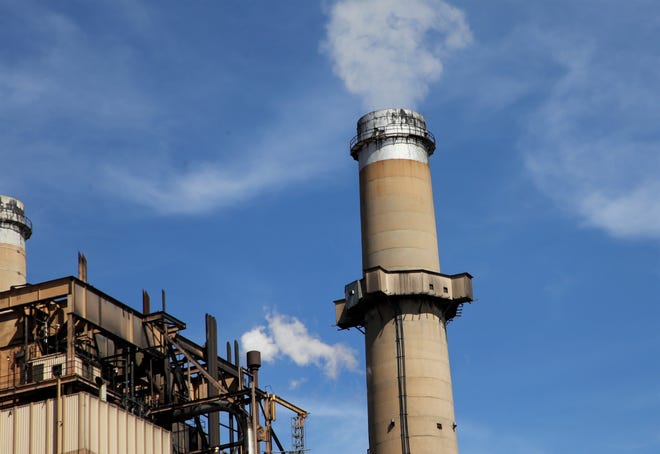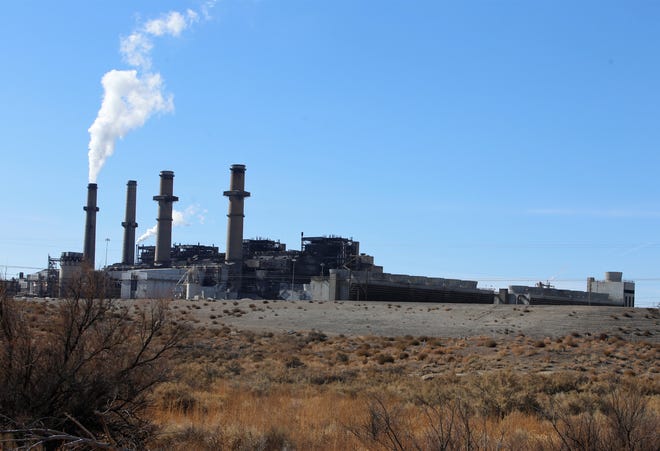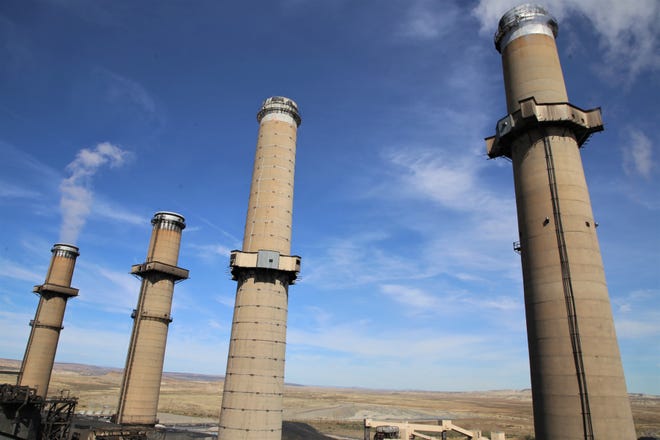2 groups are arguing that portions of the Energy Transition Act are unconstitutional
AZTEC — A pair of consumer and environmental advocacy groups are challenging the constitutionality of portions of the Energy Transition Act while also arguing that the New Mexico Public Regulation Commission failed to comply with a part of the law when it granted Public Service Company of New Mexico’s financing application for ending its operations at the San Juan Generating Station.
New Energy Economy and Citizens for Fair Rates and the Environment filed a brief in the state Supreme Court asking the court to remand the financing application to the PRC and void portions of the landmark energy bill.
"Because the appeal blocks economic and training dollars for workers and Four Corners communities, we are hopeful that the Supreme Court will rule quickly on this case," said PNM spokesman Raymond Sandoval.
The two groups argue that the portions of the Energy Transition Act that they believe are unconstitutional can be severed from the law without impacting its overall intent — providing a framework for the transition from fossil fuels to renewable energy.

Groups say law limits regulatory review
“Our constitution and laws require that a monopoly utility such as PNM be regulated," said Mariel Nanasi, the executive director of New Energy Economy, in a statement announcing the filing. "PNM cannot decide for itself what it wants to charge ratepayers when it closes an old polluting plant; that’s what regulation is for — to protect the public."
MORE:San Juan Generating Station renewable energy plan gets approval from PRC
She said the Energy Transition Act limited the PRC's regulatory review process and forced the commission to approve a financing agreement that customers will have to pay for in a non-bypassable charge over the next 25 years.
The Energy Transition Act has faced multiple legal challenges since it was enacted in 2019. Many of the arguments raised in the filing are similar to arguments New Energy Economy made in previous filings at the state Supreme Court level.

One point in the filing was made during the PRC hearing process, rejected by the hearing examiners and is now included in the court documents. This claim that PNM was required to have a securities firm weigh in on the quality of the bonds has not previously been brought to the Supreme Court.
Support local journalism with a digital subscription: http://bit.ly/2I6TU0e
PNM did had an authorized employee of a securities firm evaluate the data and issue and opinion, which the hearing examiners determined was enough to comply with the Energy Transition Act.
That is only one of eight points New Energy Economy and Citizens for Fair Rates and the Environment make in their filing.
Debate centers on securitization and impacts on ratepayers
The two groups are primarily concerned with the securitization portion of the Energy Transition Act. This allows utilities like PNM to access low-interest bonds to refinance the past investments into coal-fired power plants and use those bonds to pay for ending operations at the facility.
MORE:PRC hearing examiners recommend 3 ways for PNM to replace SJGS power
The low-interest bonds will be paid off by a non-bypassable charge on customers’ bills.
“We hope that the legislators who voted for the ETA were doing so because they were looking for an opportunity to facilitate the transition away from coal and increase the renewable portfolio standard — not to deregulate a monopoly utility and place the abandonment costs of all PNM’s gas, nuclear, and coal plants onto ratepayers. It would be entirely unfair and unlawful for the ratepayers to be stripped of their rights to regulation and protections under the law.” said Citizens for Fair Rates and the Environment Director Tom Manning in a statement.

The Energy Transition Act narrowly defines which utilities and generating assets are qualified for securitization.
Only coal-fired power plants are considered qualified generating facilities and only utilities regulated by the PRC are considered qualified utilities. That means Los Alamos County, Tucson Electric Power, and Farmington Electric Utility System — all partial owners of the San Juan Generating Station — are not considered qualified utilities for securitization under the Energy Transition Act.

In addition to helping PNM finance the abandonment — or ending of operation — at the power plant, a portion of the bonds will go to economic diversification in northwest New Mexico and to assist workers at the power plant or mine that could lose their jobs. Some proceeds will also assist the Navajo Nation.
MORE:PRC unanimously OKs PNM ending operations of San Juan Generating Station
PNM is pre-funding the portion that will assist workers and will be reimbursed by the bonds, according to Sandoval.
All of those efforts could be placed on hold if the court remands the case to the PRC.

The court filing states that the PRC could only deny PNM’s application for securitization under “narrow, ministerial circumstances.” Meanwhile, the approval of the financing application means the ratepayers will pay a non-bypassable charge for the next 25 years.
“The PRC has no authority to question the amount, to reduce it for inclusion of imprudently-incurred costs or unfairness to ratepayers or carry out its constitutional and statutory duty to balance the interests of investors and ratepayers in assessing whether PNM should get all, some or none of its request,” the court document states.
Hannah Grover covers government for The Daily Times. She can be reached at 505-564-4652 or via email at hgrover@daily-times.com.